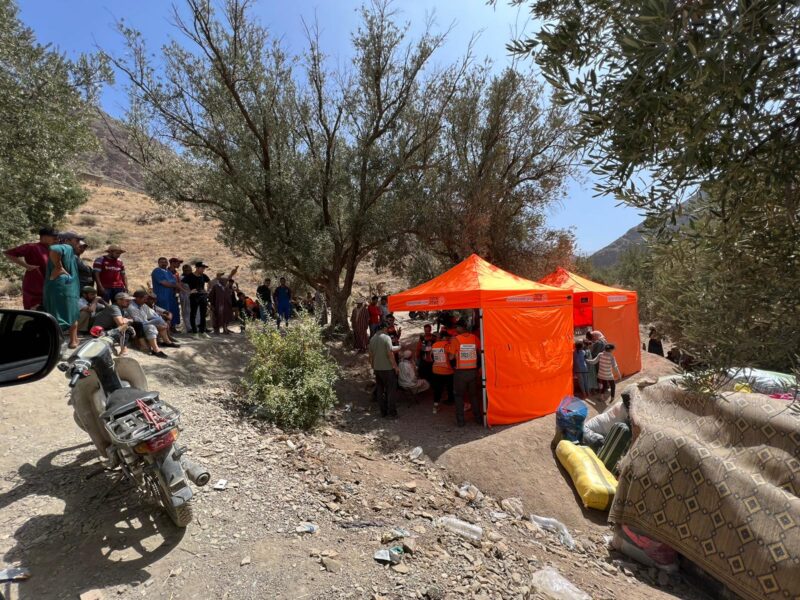Holiday help
Rosh Hashanah in the Atlas Mountains, assisting quake-struck villages
United Hatzalah delegation spends the holiday providing medical aid to remote communities in Morocco

Samuel Arrouas/United Hatzalah
A United Hatzalah team sets up a mobile clinic in a village affected by a recent earthquake in Morocco's Atlas Mountains in September 2023.
A team of 14 United Hatzalah volunteers — doctors, paramedics, nurses and others — spent Rosh Hashanah traveling to remote villages in Morocco’s Atlas Mountains, treating over 100 people each day, some of whom had been without medical attention since before the devastating earthquake struck the area on Sept. 8.
“There are usually around 300-500 people in the village. We treat around 100-200 people a day. Some of them haven’t seen a doctor in months. There are people who lost family, sometimes parents, sometimes children,” Samuel Arrouas, the director of United Hatzalah France, who is part of the delegation, told eJewishPhilanthropy on Monday.
The United Hatzalah mission traveled to Morocco days after the earthquake, which has killed more than 2,800 people, injured thousands more and affected some 300,000, according to the most recent United Nations statistics. In recent days, the United Hatzalah team, which is based in Marrakech, has been traveling from village to village, based on the recommendations of and in coordination with local authorities. The team sets up a two-tent “foldable” clinic and provides whatever medical care that its volunteers can.
According to Arrouas, after the initial wave of traumatic injuries — broken bones and wounds — there are now more “secondary” medical conditions, namely infections, headaches, stomach problems and issues related to a lack of medical care, people losing access to medications to treat high blood pressure and diabetes. Dehydration is a growing problem, he said, particularly among pregnant women, who sometimes require intravenous fluids in order to keep them and their babies healthy.
The trip to these villages each day takes at minimum three to four hours, owing to the winding, narrow roads. As these areas no longer have electricity because of the earthquake, the team must leave early enough in the afternoon to make it back to Marrakech before dark as the roads are otherwise too dangerous, even for experienced drivers, Arrouas said. To maximize time in the villages, the team sets out early each morning, he added.
When Arrouas spoke to eJP just after 7 a.m. local time, he was already hours into his journey to the village of Askaouen, south of Marrakech, where the team would be working on Monday and possibly on Tuesday.
“There has been no medical assistance in that place since the beginning,” he said. “There will be 300-400 people waiting for us. We may sleep there to avoid the trips back and forth.”
Arrouas said the trip to Askaouen from Marrakech can take up to six hours by car so they may spend the night in tents, with protection provided by local police. “The safety of my team is my top priority,” he said.
While the team is primarily focused on providing medical assistance, when members have free time, they make an effort to interact with the local residents, particularly the children.
“We give them toys, balloons,” he said. “There are a lot of orphans, who have lost parents and siblings and have no one to go to. They are very thankful. You give them a small present and you can see the stars in their eyes.”
The current United Hatzalah delegation is scheduled to leave Morocco on Thursday. It’s not yet clear if another team will replace this one. If so, Arrouas said they would be sure to overlap in order to pass on information that the team has picked up in the field.
Arrouas said that only recently, more than a week after the earthquake, have these remote mountain villages begun receiving tents and temporary shelters.
“As time passes we are seeing more and more tents,” he said. “Before [the earthquake] they didn’t have much, they had houses built of mud and hay, but now they literally have nothing.”
Arrouas said the team worked through the holiday as normal. Though most members of the United Hatzalah delegation are Jewish, there is also one Arab Israeli doctor and a Muslim paramedic from the United States who joined the team. Arrouas said he also hired local French nurses to help them as well.
“A small part of the team had enough time to pray, but the team that was in the field — we prayed for them,” he said, noting that he was able to blow the shofar for the group about an hour before the holiday ended on Sunday night.
Arrouas also praised the Jewish community in Casablanca for its hospitality during the holiday.
“The local community is amazing. We ordered catering for the team, but they said there’s absolutely no way that you are paying for food. They called the caterer and canceled the order and stayed up all night cooking for us,” he said.












